#Deduction
Explore tagged Tumblr posts
Text
Once again, I have to say that I love old TV shows because they used their creativity and imagination to create things like this. What a brilliant way to find out someone's combination to their safe!! I love this show because they think. No graphic violence. Just thought provoking TV!! We need more shows that make you think and less TV that causes anxiety and teaches criminals how to commit crimes. Just saying... 😁😍
#Perry Mason#Raymond Burr#i love Perry#thought provoking#brilliant#no graphic violence#thankful#black and white TV#love#happiness#thank you#sharing#joy#beautiful#courtroom drama#classic#60s TV#think#logic#deduction#i love this show#😁😁😁#it's still a good now as it was then#transcendent
28 notes
·
View notes
Note
Would you like to play a deduction game where you can only ask yes or no questions?
Absolutely. Go on.
#sounds fun#roleplay#rp#sherlock roleplay#sherlock rp#johnlock roleplay#johnlock rp#deduction games#deduction#games#ask games
179 notes
·
View notes
Text
Biases 2-Anchoring Bias
Here we are with another bias. This one could be one of the most important ones because of 2 reasons:
1-It affects every deduction you make.
2-You don't be open to new information even if it conflicts with your deductions.
Let's hope that after learning this bias, we can be more aware of the effects and shape our thinking in a better way.

What is the Anchoring Bias?
The anchoring bias is a cognitive bias that causes us to rely heavily on the first piece of information we are given about a topic.
That's the definition on the internet but basically, first information stays with you all the time and affects every step of your deductions.
Examples
You meet with someone and you are trying to deduce them. The moment you see them, there are already some prejudices about this person on your mind. You might think they are married because they wear a ring or they are right-handed because they carry the phone in their right pocket.
After this point, you will make your deductions based on them being married or right-handed. If some data suggest the opposite, you will either ignore it or change it and suit it to your previous deductions.
That means, if you can't manage this bias, you will go where it leads you and not where you supposed to.
Another example is if you've decided that someone is a liar, every time they tell you something that doesn't make any sense, you will determine it as a lie.

Effects
-You are going to be less receptive and less open to the new information.
-You are going to arrive at a completely different(maybe even opposite)conclusion.
-You are going to be at risk of Confirmation Bias.(We will talk about it next time.)
How to Manage the Effects?
You can start with being aware.(This applies to all biases.)Then, you can check the first information and decide if it is correct or wrong before moving forward.
The important part I realized is that every time you come to a conclusion, check if it is connected to the first information or not. Connection doesn't definitively mean you are wrong or you were affected by Anchoring Bias but it is a possibility.
So, just be aware of the first interactions/information/deductions and move forward accordingly.
“It is a capital mistake to theorize before one has data. Insensibly one begins to twist facts to suit theories, instead of theories to suit facts.” -Sherlock Holmes
#deduction#bbc sherlock#sherlock holmes#deductive reasoning#sherlock#sherlockbbc#deductionist#observer#awareness#sherlock fandom#biases#bias#elementary#cbs elementary
22 notes
·
View notes
Text
Deduction Tips #16
The size of a bag is indicative of how much a person needs to carry, and usually we prefer to carry less things. When you see someone with a bag (be it a backpack, a purse, or anything else) think about why this person needs a bigger one rather than a smaller one, and what that says about the contents of the bag and the situation of the person carrying it
#deduce#learning deduction#deductionist#deductive reasoning#deduction#sherlock#logic reasoning#observant#observation#profiling#psychology#logic#sherlock holmes#bbc sherlock#sherlock bbc#Sherlockian Deduction#How to think like Sherlock Holmes#study#studyblr#learning#tips#memory#mind palace#microexpressions#criminal minds#the mentalist#house md#elementary#body language
77 notes
·
View notes
Text
whenever Im bored I try to deduce people like sherlock does and feel like the smartest bitch in the world whenever I get something right
30 notes
·
View notes
Text
RANDOM DISCOVERY
It was a normal day and I was practicing by observing a hand-held mirror.
The holding part was on the left, and I asked myself: "can this tell me what the handed-ness of this person is?".
Intuitively, this person would be left-handed as he held the mirror left hand, placed it down with left hand so the holding part is pointing left.
But what if his dominant hand is busy so that he holds the mirror with the other hand.
Same-thing can be seen with people opening the door with their non-dominant hand.
This can leads to things that combine with holding a mirror such as makeup, cutting his hair, etc.
What I wanted to say is, this piece of information doesn't tell you who this person is (1 step deduction), but rather a laying ground to get to the next step of deduction.
Let say if you find out this person this right-handed from other clues then combine with this piece, you can also confirm or suspect this person does makeup or cut his own hair, etc. and start looking for more evidences.
This makes me think about there's 2 types of objects:
1. One must be used with the dominant hand: pen, mouse, spoon. This requires a person to be focus, precise
2. One that can also be used with other hand: doorknob, cup of tea( with a spoon), etc. The action doesn't require the same amount of mental strength. Interchangeable which hand they use.
Random discoveries happen when you practice.
28 notes
·
View notes
Text
Visualizing the Building Theory using BBC Sherlock
@amateur-deductions recently did a post on the Building Theory. In his words:
[The Building Theory] serves as a wonderful way to illustrate how much a deduction is a progressive process, with multiple little steps between observations and conclusions. It's also an amazing tool to analyze other people's deductions and break them down in a way that allows you to map out their trains of thought and learn from them
He provides an excellent explanation of how the theory works: basically, you think of the process of deducing as constructing a building, with observations and subsequent deductions representing bricks that are stacked on top of one another, building up to more complex deductions based on those original observations & deductions.
I’ve always liked this theory because it makes the process of deduction more tangible and visual, which helps me learn, and I know others like to use visuals to learn too.
I’ve mapped out deductions from BBC Sherlock before, so I thought sharing that here would help provide a visual supplement to @amateur-deductions‘ work.
When Sherlock and John first meet, Sherlock asks: “Afghanistan or Iraq?”
You can watch the scene where he asks that here. And the scene where he explains how he got to that here.
While the show provides a decent verbal breakdown of how Sherlock got to that question, we can also visualize his process like this:
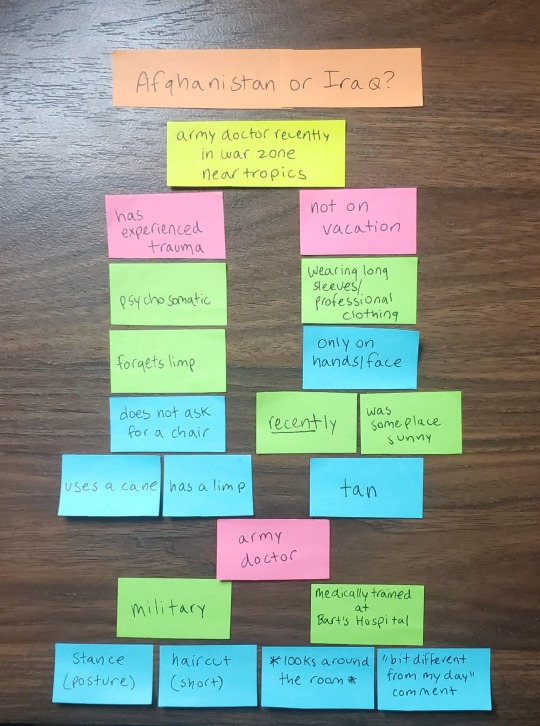
blue: observations // green: deductions made from observations // pink: deductions made from prior deductions & observations (level 1) // yellow: deductions made from prior deductions (level 2)
As you can see, Sherlock uses his initial observations about John to make deductions, and then uses those deductions to make additional deductions. All of this culminates in him asking John “Afghanistan or Iraq?”
Let’s break down this process a bit. We can think of this building as being made up of a bottom floor, and then two supporting sides that work together to build onto that bottom floor and also support the roof placed on top.
First, the bottom floor:
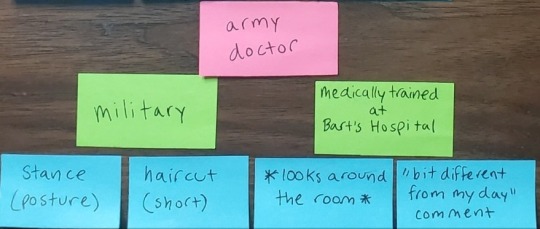
When John enters the room, Sherlock looks up at him and makes four observations about him, which he uses to make two deductions.
1. stance + haircut = military
** Sherlock knows that these observations = military from knowledge he has about the appearance/behavior of people in the military.
2. looks around the room + says “bit different from my day” = medically trained at Bart’s Hospital
** Here Sherlock uses a combination of knowledge and logic. He knows that Bart’s Hospital is a well-known training hospital and if John is familiar with the lab that the pair are standing in (as opposed to a patient room), he must have been a student there.
Sherlock then takes those two deductions and combines them to create another: military + medically trained = army doctor. That deduction forms the base of the rest of the building.
Next, there are two supporting sides. Let’s call them the “limp” side and “tan” side, as those are the two observations that form the base of each.
First, the limp:
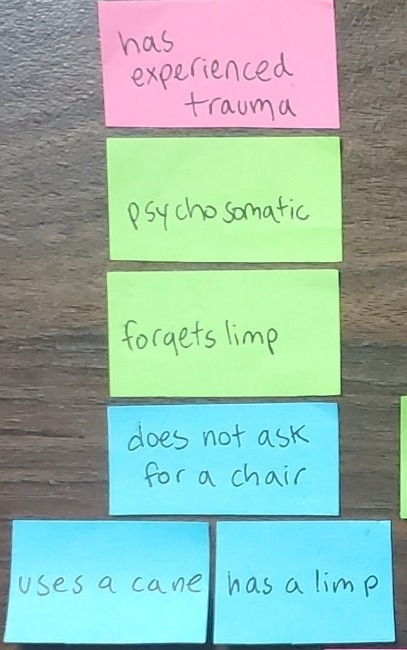
Sherlock begins with several observations:
1. has a limp and uses a cane.
2. does not ask for a chair to sit in.
** Knowledge: Sherlock knows that people with limps may look for or ask for somewhere to sit.
From this, Sherlock deduces that John:
1. forgets he has the limp.
2. Why? Because the limp is psychosomatic.
** Knowledge: Sherlock knows about psychosomatic injuries.
3. Which means that trauma caused the limp.
Second, the tan:

Again, Sherlock begins with two observations, and each have their own subsequent deduction.
1. has a tan. = was recently in a sunny place.
** Knowledge: Sherlock knows that people get a tan from being in the sun, and that tans fade over time.
2. only has a tan on his hands and face. = was in a sunny place while wearing long sleeves, so he was not on vacation or sunbathing, but was on business.
** Knowledge: Sherlock knows that when people go on vacation to a sunny location, it is not typical to wear long sleeves or professional clothing but rather dress casual (shorts and a t-shirt, swimsuits, etc.).
Here is where Sherlock’s process culminates into the question. Relying on the deduction that John is an army doctor, and combining that deduction with these two new deductions (1) has a limp from trauma, and (2) was recently in a sunny place for business/work, Sherlock makes this final deduction: John is an army doctor who was recently in a war zone near the tropics.
He cannot go further than this though, as there are a few locations that fit that description. So, Sherlock engages in order to get the information he needs: “Afghanistan or Iraq?”
~
I hope this provided a helpful visual example of the Building Theory - if anybody has any questions or wants me to go into more detail on any aspect of this example, please ask!
73 notes
·
View notes
Note
When it comes to the observation weeks in the training program. Could you elaborate on why we shouldn’t deduce then? Is it only about the time when we are doing the exercises?
Hello! great question, i gotta say i didn't write that program, but i did follow it, so i can only give you an answer based on my experience with it and with deduction as a whole. Unfortunately L isn't available to give you the original reason, but if i get in contact with them i'll make a post with their answer.
So, there's this quote from Sherlock which sums up the reasoning behind this very clearly:
"It is a capital mistake to theorize before one has data. Insensibly one begins to twist facts to suit theories, instead of theories to suit facts."
During this stage of the program it is assumed you're coming into deduction as a complete beginner, and therefore that you haven't honed your observation skills yet. This means you'll inevitably be at a point where if you try to deduce you'll be doing so while missing a large amount of information, and fall into the trap of not knowing you're missing information and trying to work with what you have, which leads to often taking big leaps in reasoning to reach conclusions, because you don't have enough data to work with.
This is also why when i teach people i make sure they're at an acceptable level in their observation skills before i move onto other stuff. Later on in the process you learn how to make the most out of a situation where you have little to no information to deduce from. But that's a bit too complicated for a beginner, so it's important that they don't try to deduce until they have a solid grasp on what information they can gather
Aditionally, the training program, as incomplete as it may be, attempts to separate the process of learning deduction into manageable chunks. That program was written during a time where the community was much bigger and everyone attempting to find some way of learning this skill. Everyone was coming up with solutions to their problems and sharing them in the community, and that program is an attempt to solve the overwhelming feeling that comes with trying to learn a massive skill with multiple possible points of entry. It segments it into manageable, organized chunks for people to have a neat way of getting started with deduction, and one of those chunks is just observation, since it's complex enough of a base skill to have its own section
#deduce#learning deduction#deductionist#deductive reasoning#deduction#sherlock#logic reasoning#observant#observation#profiling#psychology#logic#sherlock holmes#bbc sherlock#sherlock bbc#Sherlockian Deduction#How to think like Sherlock Holmes#study#studyblr#learning#tips#memory#mind palace#microexpressions#criminal minds#the mentalist#house md#elementary#body language#answers
16 notes
·
View notes
Text
Culturing Bacteria in a Petri dish With Agar; an experiment/observation

Today's post is quite different from the usual;
So, we had to do a project in the educational institution I study in; Which was growing bacteria in a Petri dish with agar.
Today, the results came in, but our professor insisted that we have to throw the dishes in the bin. I didn't give up there; after talking to her for a short amount of time, she accepted that I can take the dish with me to my flat, and have a look at it with microscope.
I still cannot comprehend why other students were disgusted by them; they are beyond wonderful.
Allow me to explain this astonishing journey:
What exactly is agar?
Well, agar, derived from the minute aquatic organism known as seaweed or algae, specifically the types Gelidium or Gracilaria, is a widely employed gelling agent. Found abundantly in the coastal regions of East Asia, particularly Japan and South Korea, it undergoes a process of cleaning and extraction to obtain agar in its usable forms of dry strips, flakes, or powdered consistency.
Now, when it comes to the realm of cell and bacterial culture, agar assumes a pivotal role as a solidifying and gelling medium within culture media. Its remarkable gel-forming properties allow for the creation of a three-dimensional matrix, offering an ideal environment for the growth and sustenance of cells and bacteria alike. Nutrients and metabolites find efficient transfer within this agar-based culture medium, while its structural integrity ensures the confinement of cells to designated areas.
Agar's utilization in cell and bacterial culture provides a multitude of advantages, including its ease of implementation, stability, and facilitation of cell separation procedures. The versatility of agar finds application in diverse fields, from microbiology to biotechnology and pharmaceutical industries.
Bacteria can be found on any surface, anywhere.
I decided to pick them up from my shoe soles.
After extracting bacteria from the soles of the shoes, I cultured them in an agar-containing Petri dish. After one week, I observed bacterial and fungus growth in this environment. Here are some images I captured with my microscope:

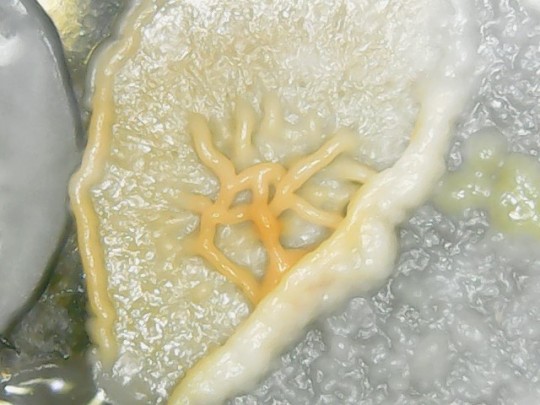

Wonderful, aren't they?
ND
#bacteria#fungus#deduction#tumblr#deducter#deduce#deductive reasoning#science of deduction#tumblrpost
42 notes
·
View notes
Text
Sherlock & Co.
Small post today for me to scream about my newfound love for the Sherlock & Co. Podcast. I found it two hours ago and have been listening non-stop ever since. I cannot recommend this enough to BBC Sherlock fans, especially those who have been craving a 2023 take. There's even a frequently updated twitter/X by Dr. Watson himself (@DocJWatsonMD). They're making a modern dramatization of the entire original canon!!
The only breaks I've taken have been to literally screech about how excited I am and to write this post.
Spotify and youtube link for those interested!
Spotify - https://open.spotify.com/show/5yfvdowY1nFCyXRTD5ITqb?si=5bb581b5624c437a
Youtube - https://www.youtube.com/@SherlockPod
AHHHHHHHH
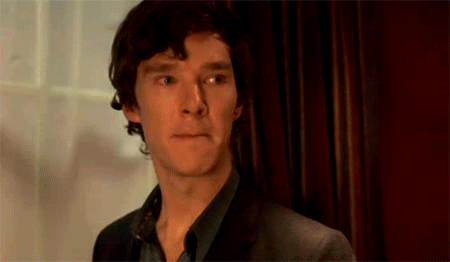
28 notes
·
View notes
Text
My deduction and observation skills have gone downhill recently, barely any practice, if any trying to deduce someone on the street in 5 seconds of which I am not capable because of my very novice level in this field.
I am losing hope and faith in myself, but I don’t want to give up, I can’t - I wouldn’t be able to live with myself if I did.
I’ll try again and again.
Let’s try it like this: if I’m not doing anything specific I will observe and deduce.
Let’s see where this journey takes me
-BH
11 notes
·
View notes
Note
Just curious how do you employ your deductive methods in every day life(john)
I just observe. It is like a reflex, I cannot shut it off. Just looking at John creates an influx of data and information about his mood, his plans for that day, how he slept, his condition and many other points. His physical state, whether he is in pain, tired or hungry. Whether he had a good night's sleep depending on his posture or tension around his eyes or his shoulders. If he is planning to meet up with someone depending on his choice of clothes and aftershave on special occassions. His gait and movements show whether it is a good day or if he is in any pain. I can tell if he is worried or wants to talk about something by the furrow of his brow. When he keeps checking his phone repeatedly he is waiting for a message, for example when he is concerned about his sister not answering his texts. I can tell what he is thinking about, visible in unconscious movements like twitches, the frequency with which he licks his lips or the direction of his gaze. Whether he craves something when he keeps glancing towards it. The tone of his voice and how talkative he is can show many things. When he is fidgety and barely able to sit still in his chair, it means that he is bored and would like to go out on an adventure. Of course I can deduce many more things but I think I provided more than enough examples. I can deduce John better than anyone else, because I am very familiar with him, have spent so much time with him and analysed his behavioural patterns. Although it took me some time to truly realise what he feels for me, but sentiment is not my area of expertise after all. He is the exception, even concerning my deductions.
#roleplay#rp#sherlock roleplay#johnlock roleplay#sherlock#johnlock rp#bbc sherlock#sherlock holmes#john watson#sherlock rp#johnlock#sherlock holmes rp#sherlock holmes roleplay#replies#sherlock replies#sherlock holmes replies#deduction#deductions#the science of deduction#deductive methods
59 notes
·
View notes
Text
Biases 1-Baader-Meinhof Effect
This is the start of a new post series. From now on, I will share biases with examples from daily life. "Why?" could be the question on your mind. Because biases are the first thing that shape your deductions. So, if we are aware of them, we can at least try to decrease their effect.(We can't delete them. Only we can control them.)
If you are ready to face yourself and ready to change it, let's start with the first one: the Baader-Meinhof Effect.

Let's say you went shopping for shoes. You saw a brand new model of shoes you've never seen before and thought "Wow. That's a brand new model." You left the shop and went home. A few days later, you start to realize that a lot of people have the same shoes you have. The first thought is: "This shoe is starting to become popular. Everybody buys it nowadays." And here is the bias.

The real reason you started to notice this shoe model is because you've just bought it and your brain became aware of it. Then, started to show it to you everywhere you go.
This bias is also called:
-Frequency Illusion -Selective-Attention Bias
-Recency Illusion
You can apply it to everything you've just become aware of. So, how can we as "Deductionists" use it to our advantage and be aware of the dangers?

First of all, the biggest danger is the effects on your deductions. If you've read or learned something, you will have more tendency to see the situations in the way you learned them. For example, married people wear a ring on their ring finger. When you learn that, you will notice a lot of rings on people's fingers and you will be more likely to see all of them as married. So, whenever you learn something new, be aware of that.
And now, how to use it to our advantage? If you can learn something and you can start to notice that a lot, that means if we learn a lot of information about the things we see in daily life, we will be more aware of them. If you learn all of the shoe brands and models, whenever you go out you will notice the shoes and you will also know the model. That means you are going to miss less information.
So, start learning and noticing more. Just be careful about the ways it can distort the information. That's all for this post.
#deduction#bbc sherlock#sherlock holmes#deductive reasoning#sherlock#sherlockbbc#deductionist#observer#awareness#sherlock fandom#biases#bias
14 notes
·
View notes
Note
Hi!!! How can deductions be used in day to day life, or like, usefully? And how have you made useful deductions? Sorry if that made little sense
Hi! I see you sent this question in the past two days, i'll gladly answer it, but in case you send any other questions in the future and i don't answer them as quickly i'll inform you that usually all the questions of the week are collected in my inbox and you'd get your answer on a Monday (this week i had some scheduling problems so i pushed it to Wednesday), so if you don't get as quick an answer next time just wait for Monday!
Now, regarding your question! There's many ways deduction can be used in daily life, sometimes it even depends on what you do for a living. For example i know psychologists and other healthcare profesionals have to rely on non verbal communication and information they gather from observation, along with what they're told, since patients can't be relied upon to be transparent and honest all the time, or even know what information is releant to share. In this case deduction can be massively useful.
On a more general note, it depends a lot on the type of relationships you have, i know people who use deduction to interact with their friends, it allows them to know when they're feeling upset or worried, and about what, and act accordingly, all without needing to do more than just glance at them. I know people who use deduction to navigate social situations because they're not good at interacting with people and having the extra information deduction provides helps. Personally i'm someone that introduces deduction into everything i do, from acquiring helpful knowledge when talking to superiors, to knowing what waiter is best to call over at my table cause they've gotten more hours of sleep.
I recommend you watch Sherlock, House M.D., The Mentalist, and all of these deduction heavy shows that sometimes showcase how these characters use their skills casually, it's really not much different than what you see there. If you want a blog that really goes into casual uses of dedduction i'd check out @froogboi 's blog, it's full of everyday life uses of deduction
#deduce#learning deduction#deductionist#deductive reasoning#deduction#sherlock#logic reasoning#observant#observation#profiling#psychology#logic#sherlock holmes#bbc sherlock#sherlock bbc#Sherlockian Deduction#How to think like Sherlock Holmes#study#studyblr#learning#tips#memory#mind palace#microexpressions#criminal minds#the mentalist#house md#elementary#body language#answers
26 notes
·
View notes
Text
Deducing With Disorders Pt. 1
Dissociative Disorders: TW - Mentions/Descriptions of Dissociation
Credit to @sleuth2k7 for the idea
So quick disclaimer: I am not a certified psychologist, I am giving generalized advice for deducing with disorders that I have been diagnosed with based on my personal experience. Nothing is one-size-fits-all.
When I was 15 I was diagnosed with derealization/depersonalization disorder. DR/DP is one of three types of dissociative disorders spanning approximately 1%-2% of the population, and as with all dissociative disorders, involves repeated episodes of disconnection from one's sense of self and surroundings. With DR/DP specifically, I experience long episodes of what I can only describe as having a VR headset glued on where you can only watch what's happening to your character, and you just have this certainty nothing in this world is real, occasionally being removed from the driver's seat entirely and placed further back in the VR world by some part of your brain that belongs to you on every count except your own.
TLDR: Am I real? Are you? How to deduce when you aren't sure if you're real is the question.
Answer: I personally do reality checks to start, and I incorporate deduction into that. Am I real? Well does 2+2 still equal 4? Do those baggy pants plus that ill-fitting suit still mean that this teenager is wearing his dad's clothes? Probably. Let's find out.
So when we're reconnecting to ourselves and our surroundings, we look for things that verify our experience as truly our own. Make it a game. Certain deductions are worth certain points, it can help to have a friend to play with. A profession is worth 5, a relationship status is worth 10, etc. No friend? No problem. The classic grounding method of listing 5 things you see, 4 you hear, 3 you can touch, 2 you can smell, and 1 thing you can taste can be built upon to be a more mindful exercise that you don't just run right through.
When listing your sensory observations, use your list to then deduce things about the person. For example, I used to smoke, quit like 2 or 3 years ago, but my ex would always be able to know I had been smoking when I was within 20 feet of her. She could see the nicotine stains, the smudge of ash on my thumb from flicking the cigarette, the lump of a crumpled cigarette pack in my pocket, and not just the obvious pieces of information, she saw the cologne in my bag, and the look on the faces of my friends who would smoke with me before school. For sound she may have heard the dry smoker's cough, the crackling of a lit cigarette, the spritz of a bottle of cologne before I walked up to her, and the click of a lighter in my fidgeting hands. She would reach out and touch the grainy bits of ash on my shirt, and feel the tremors in my hand, and the movement of the pack in my pocket. Obviously, she could smell the tar and smoke of the cigarette, even under the smell of my cologne. Even if I had brought a change of clothes, sprayed copious amounts of cologne, and washed my hands, she could always taste it when we kissed.
All this is of course the long-winded way to say that mindfulness is a invaluable tool when deducing with a disorder that separates you from reality. Hopefully, you can use these mindfulness techniques in conjunction with abductive reasoning to reconnect with yourself and your surroundings. I apologize for the brevity of the post, but rest assured the quality and frequency of posts should be back up to standard soon.
#logical reasoning#deduction#logical deduction#deductive reasoning#psychology#derealization#depersonalisation tw
13 notes
·
View notes
